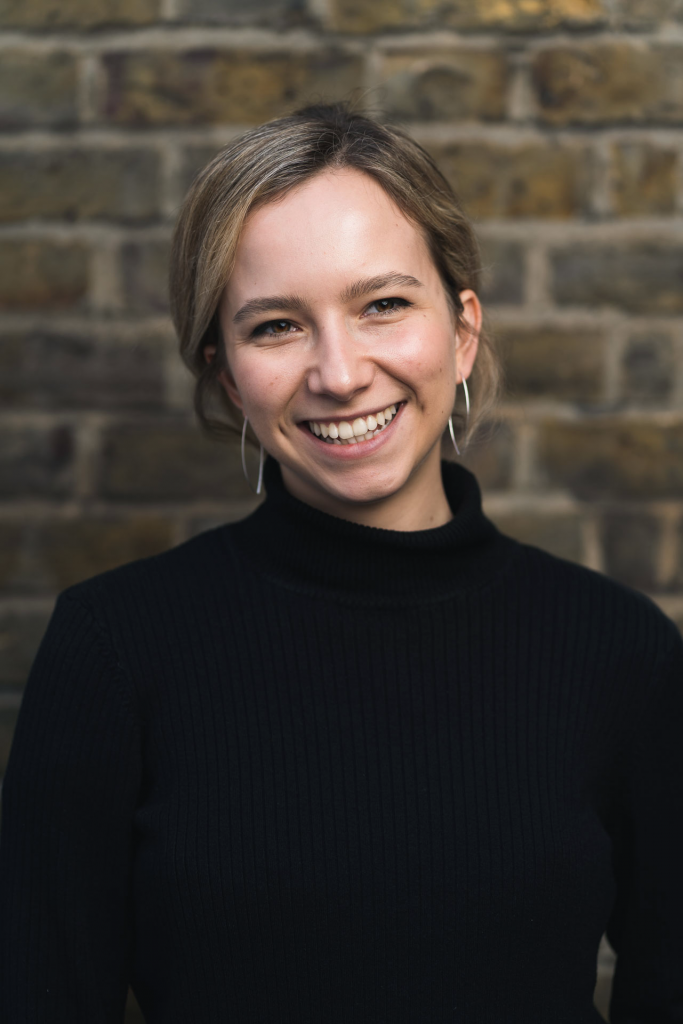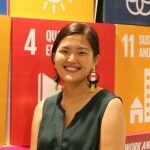COY16
The 16th UN Climate Change Conference of Youth
From Eco-Anxiety to Climate Action
An interview with Clover Hogan
By Jane Kim
Edited by Julieta Marino Tartaglino

“I am a 22-year-old climate activist and the Founder and Executive Director of the Force of Nature.“ This is how Clover Hogan introduced herself when asked to launch her identity to COY16.
Among the numerous titles she possesses, such as researcher of eco-anxiety, director and host of a podcast, TED speaker with 1 million + views, or plant burger enthusiast as her Twitter bio says, Clover settled for this. Looking back now, her self-introduction is very accurate, a complete package of all who she is and more.
Clover grew up in tropical north Queensland in Australia, where she found herself to be very much in nature, as she described, “my living room had about three walls, so I spent more time outside than in,” she chuckles. “Nature was my greatest place I found awe and wonder in, and it was where I found safety and solitude.” However, her bubble popped at the age of 11, when she started to watch documentaries like The Cove, and the Inconvenient Truth. “I was filled with these difficult emotions that I didn’t know what to do with. In retrospect, I would definitely describe that as eco-anxiety and something more nuanced- eco-phobia, which relates to the feeling of powerlessness in the face of ‘cataclysmical’ environmental change.”
Like many of us she found herself confused, she could not understand how it was the first time she was learning about the climate crisis. “We hadn’t talked about it in school, we hadn’t talked about it around the dinner table, I hadn’t read about it in the media. So while I tried to make sense of these issues, I also tried to make sense of how the adults in my life were so good at pretending that they didn’t exist.”
Does this feeling have a name?
Eco-anxiety is not only jargon from the climate agenda, it is a feeling one can be completely exposed to and not know the name for. As such, we asked Clover, a researcher and veteran in this area “What exactly is eco-anxiety?”
“Eco-anxiety describes something that has existed for many years, but something we just haven’t had the language for. It relates to those feelings of anger, stress, sadness, and frustration in response to the climate crisis. And particularly in the case of young people, it’s the feelings in response to the perceived inaction.”
Clover explains how we have inherited this huge overwhelming challenge, yet when we look to the institutions that are supposed to be there to tackle this challenge and save our future, we don’t see the required action. Neither in pace nor scale.
“Eco-anxiety is a perfectly natural, human, gut-response to the climate crisis,” she asserts. “Everything we do at the Force of Nature is naming those feelings and how we can begin to channel them into action and make a difference.
The first time Clover truly encountered the term eco-anxiety and realized how much she was affected by it was in November of 2019. From afar, she watched her home of Australia engulfed in flames from the wildfires. Until this catastrophic event, climate change was something Clover had read about in articles or seen in documentaries.
Admitting that she grew up in a bubble of relative climate privilege, the fires were the first direct threats Clover saw to her culture, her childhood, the very place that carved her into an environmentalist. “This was when I found eco-anxiety, and really started researching the mental well-being impact of the climate crisis and the critical role of being in the right mindset and being able to mobilize action for climate.”
For Clover, although she acknowledges that these feelings can be difficult, she also insists that they can be the best indicators of what we care about. “The climate psychologists we have spoken to have said, ‘The problem is not that lots and lots of young people are eco-anxious; it’s that more people in positions of power are not.’ Eco-anxiety was a kind of compass to how deeply I care about the issues, the problems. I recognized that if I were to do nothing, the feelings of eco-anxiety would just ferment into powerlessness, and it would be a paralyzing force rather than a catalyzing one.”
Why is it so talked about now?
Clover suggests that part of the reason we feel so overwhelmed particularly in the age of social media is that we are constantly bombarded with information. “We’re learning about coral bleaching, what’s happening in Afghanistan, the fires in Turkey through Portugal and Greece. You’re in this constant pulse of ‘doomscrolling’, which can also lead to a tendency to spread ourselves thin across lots of different issues.”
Force of Nature
Realizing her personal influence was in communicating, in storytelling, persuading, rallying, and bringing people together, Clover channeled the emotions she was experiencing to where she could personally have an impact. “I thought, ‘How can I bring together the thing I love doing, with the problem I am so passionate about?’ For Clover, it was about finding that focus, and more tangibly, entering the world of activism. She started Force of Nature, her youth-led organization dedicated to mobilising mindsets for climate action, “it was in response to a very visceral need,” Clover avows, recalling how the entire journey of creating Force of Nature, which now engages with systems and institutions to talk to policymakers, and works with big corporations like P&G, Pepsi Co., and Nestle that affect billions of lives every single day.
“I had been volunteering for a couple of years across the classrooms in the UK, talking to kids about sustainability. It was around the time of the Youth Strikes for Climate… I didn’t hear the cries of passionate young people, I heard eco-anxious young people and young people who were terrified of the future we were inheriting.” Clover created Force of Nature out of the need of solving the problem of the climate crisis, knowing it was absolutely pivotal to have a generation of young people who feel empowered to take action on the issues.
A catalyser
Where does eco-anxiety come into all this? “At Force of Nature, naming eco-anxiety is empowering,” Clover says. “A lot of what we do is destigmatizing the experience of eco-anxiety.”
She makes the point that we live in a world where there is such a thing as good feelings and bad feelings “While the good feelings are success, achievement, joy, or confidence, bad feelings are anxiety, stress, and sadness.” However, Clover sees these difficult emotions as what actually means to be human, the reasons we have evolved into the creatures we are. She argues that experiencing those feelings is actually a very healthy response and catalyzes that action.
Why is it important to name eco-anxiety? “Putting words to feelings is very empowering,” contends Clover. “It’s a human response to the issue and is a sign of humanity, a sign that you are awake to these issues.” She says that when one takes a broader look at climate change, a large part of why we haven’t solved it is because as a culture, we have gotten so good at switching off our feelings and numbing ourselves to the crises that affect generations.
“If we can sit in a discomfort of our feelings, we can wake ourselves up to them. This is the recipe we need for action.”
Clover encourages talking about these feelings, connecting with others through those emotions, and beginning to develop a healthy relationship with them to bring agency to these sentiments.
She attests that rather than being held to those feelings, being able to critically think, “These are the emotions that fuel my activism. What are the other feelings I need to bring into those things to sustain my activism?” is key, whether it’s a sense of connectedness to one’s community, agency and focus, or a sense of a vision of the world we want to create.
From crisis to action
How we can recognize these feelings and try to convert them into action. How about the broken systems that rule our society and the adults in them? How can we make sure their actions and feelings are translated into action? “There’s a lot of vested interest for people to shut down and not take action. However, rather than denial, the trend that big fossil fuel industries and companies are taking is fueling this doomest thinking that is around the climate crisis.”
Clover emphasises that to challenge the big systems and narratives we subscribe to as a culture, the first step is to just sit in those feelings and choosing not to switch off. Recognizing that this is exactly what COY is doing, she applauds the fact that the youth are showing up, thus completing the most important step. “You’ve already chosen not to sit on the sidelines, you’ve chosen to put your hands in the mud and to be a part of the solution,” she says.
Commenting that she is actually an alumnus of COY having attended COY11, Clover explains how it was an incredible launchpad, one of her first empowering experiences of other passionate young people about the same issues. She makes a point of telling us about intergenerational exchange, which is also something at the center of Force of Nature. According to Clover, intergenerational exchange enables young people to walk the corridors of power and in doing so, having those conversations with the decision makers shifts an institutional mindset.
Reflecting on the fact that institutions are made of organizations that are made up of individuals, she encourages the COY activists unifying for change that connecting at a familial, personal level with the people around us is an incredible force for change. “When we use those feelings for actions, we inevitably influence people in our spheres of influence, in our neighborhood, our community, family and peer group.”
Stating that systems are manifestations of the stories we subscribe to as a culture, as a society, and thus shouldn’t be seen as impermeable, Clover says this: “The more we are able to challenge those stories on an individual, in a community… the more we are able to challenge those stories on a global level as well.”
Clover’s message to the change-making youth at COY16
“Never see your age or your youthfulness as a barrier. Rather, see it as an incredible thing that sets you apart. I think that young people are at a unique advantage where we haven’t been a part of these systems for so long that we’ve become conditioned to them. We can actually see outside of the currently broken systems as to how we might challenge them, or disrupt them. It is that capacity to think differently, the capacity for imagination, that makes us really natural changemakers. So, sound the alarm, and say ‘Here’s the goalpost, and here’s what we’re looking towards.”
For more information about Clover and The Force of Nature, visit their website.
For a crash course on eco-anxiety and inspiration from other young voices, dive into the just-launched Season 2 of the Force of Nature podcast, We Need to Talk About Eco-anxiety.
Written by:

Jane Kim
VOLUNTEER COoRDINATION and communications volunteer
south Korea
Edited by:

Julieta Marino Tartaglino
communications Coordinator
argentina
© 2023 Conference of Youth 16